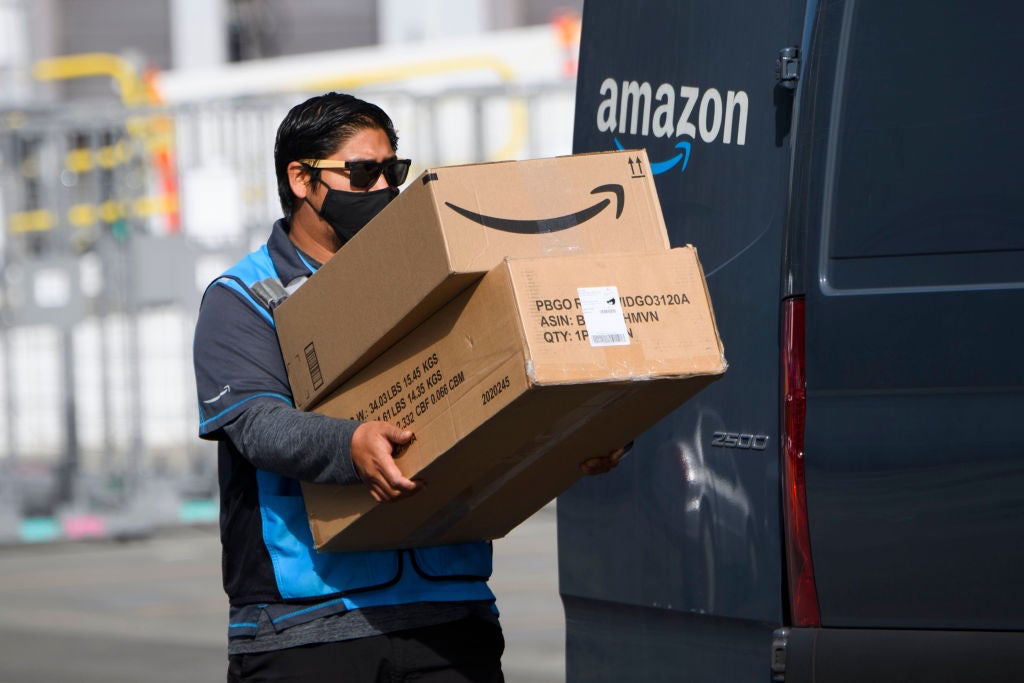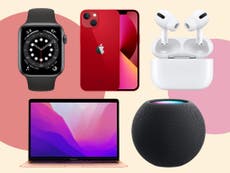I used Amazon because I was lazy – I quit a year ago and I’m better for it
I stopped being click-happy and reliant on last-minute items that arrived within hours – at a potential cost to someone else’s wellbeing


Your support helps us to tell the story
From reproductive rights to climate change to Big Tech, The Independent is on the ground when the story is developing. Whether it's investigating the financials of Elon Musk's pro-Trump PAC or producing our latest documentary, 'The A Word', which shines a light on the American women fighting for reproductive rights, we know how important it is to parse out the facts from the messaging.
At such a critical moment in US history, we need reporters on the ground. Your donation allows us to keep sending journalists to speak to both sides of the story.
The Independent is trusted by Americans across the entire political spectrum. And unlike many other quality news outlets, we choose not to lock Americans out of our reporting and analysis with paywalls. We believe quality journalism should be available to everyone, paid for by those who can afford it.
Your support makes all the difference.January – a month of festive comedown. A chance to start afresh, and a time of so-called wellness, while battling with the overarching raging hangover as a result of the month before.
So, when I was faced with a megaphone-laden protestor on an east London high street last January, you can imagine my disdain. “Jeff Bezos earns more than an average Amazon worker’s weekly salary in one second,” she shouted, while I winced.
As I walked away to buy some conspicuous-looking green leaves that would apparently make up for the last month of having a pure sugar diet, I couldn’t shake off her words. The sizeable wealth that one man made in my few steps to the vegetable aisle left me gobsmacked – and feeling pretty nauseous.
Allegations have been trickling in under our noses for years about Amazon and some of its subcontractors, and its staff. Factory and delivery workers have alleged that they’ve been worked like “robots” and “slaves” in sub-par factories that were fire risks or potentially fatal, and say they had to endure “gruelling” working conditions without sufficient toilet breaks. Last March, it was again claimed that Amazon’s delivery drivers worked 14-hour days and used plastic bottles to urinate in, or bags to defecate in, for fear of missing tight targets.
I’m a fierce advocate for women’s and human rights, but I still read these stories with disdain while blindly spending more than £100 a month on the site. So, why was I still funding the second-richest man in the world (in November 2021, Elon Musk beat him to the top spot) if it went against every fibre of my being? Admittedly, it was for ease. I was lazy.
I vowed never to fund Amazon again – and 12 months later, I have kept my promise. It was tricky at first, when I felt like I “needed” something, like a gift for a friend in 48 hours, or some random kitchen utensil, or a blow-up plastic drunken purchase I’d bin after one use. At first, I felt helpless without it.
But I restrained myself from buying things I simply didn’t need and adding to the current climate of being surrounded by useless, materialistic things that ultimately end up in landfills or burned abroad.
I was sustainable in my everyday life, a vegetarian and dairy-free as a result of my eco-consciousness. I used coconut husk scourers instead of sponges, plastic-free laundry subscriptions and even bought recycled toilet rolls, for God’s sake. I didn’t fund online so-called fast-fashion brands, so it was ironic that I was filling my rooms with items with a short lifespan from Amazon, driven miles by lorry drivers who allegedly don’t even get a loo break.
I deleted my account, and turned my head to local, independent shops. I bought flowers for friends, sourced items I “really” needed locally, or made do with what I had. I found that if I slept on something I thought I wanted, and didn’t wake up in a sweat dreaming about it, I didn’t need it.
I shopped where I could buy reused and upcycled goods, like eBay and Etsy, sent friends books from little bookshops and made them hampers of baked goods – choosing thoughtful, memory-making gifts, rather than one that arrived in a plastic-coated box with an Amazon packing slip inside that said “happy birthday X”.
I stopped being click-happy and reliant on last-minute items that arrived within hours – at a potential cost to someone else’s wellbeing. I was relieving the pressure from a worker’s shoulders to deliver a package in less than 12 hours.
Shockingly, last June, CNBC reported that Amazon workers suffered injuries at a higher rate than any other company – with 5.9 people seriously injured in every 100. That’s an 80 per cent difference in injuries in comparison with its rivals. In response to this, an Amazon spokesperson said: “While any incident is one too many, we are continuously learning and seeing improvements through ergonomics programmes, guided exercises at employees’ workstations, mechanical assistance equipment, workstation setup and design, and forklift telematics and guardrails – to name a few.”
As I weighed up what I “needed” against alleged basic human rights violations and the loud, capitalist-fuelled events like Amazon Prime Day and Black Friday went by without a purchase. All the while, factory workers allegedly endured an “atmosphere of fear”, with workloads only increasing during coronavirus lockdowns.
To keep up to speed with all the latest opinions and comment, sign up to our free weekly Voices Dispatches newsletter by clicking here
Since going Amazon-free, I would estimate I’ve saved around £2,000 in 12 months, and have not funded one of the world’s richest men. Still, I’m not naive enough to think that indie shops and consciously shopping on other sites is ultimately cheaper, and no, not everyone can afford it. But everyone can afford to have basic human morals, and I’d implore them to think twice before relying on Amazon for ease in the future.
Yes, it’s a saving of a few quid for you – but at what cost? I know I’d rather fund an independent bookshop than a man who spent $5.5bn (£4bn) going to space for 10 minutes and 10 seconds, instead of stopping an estimated 37.5 million people from starving. I plan on never shopping on Amazon again, and have even promised to boycott other companies facing allegations of human rights abuses in 2022 too.
So, this January, while you’re clearing out cupboards of stuff that you’ve perhaps never used or worn, to replace them with more things from Amazon, ask yourself: is what you are about to buy really necessary?



Join our commenting forum
Join thought-provoking conversations, follow other Independent readers and see their replies
Comments